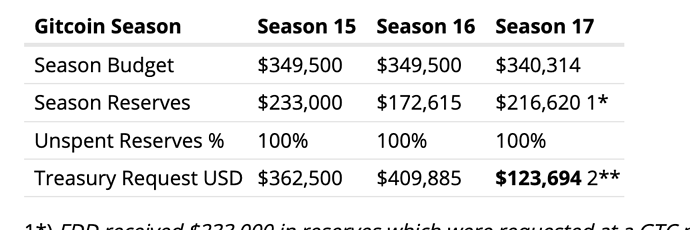Let’s Revote
First, I am seeing broader sentiment that requests the revote. I’m quite disappointed that there isn’t more enthusiasm around finding a legitimate way to determine if a revote will happen. We have an opportunity to find a more legitimate solution - a solution EVERY ALLO PROGRAM MANGER NEEDS.
We could direct power for revote to the steward council. For example, a Snapshot vote with the following options:
- Revote
- Have steward council decide if a revote should happen and set precedent for how revotes are made legitimate
- Keep the results of the first vote
I believe that either 1 or 2 would end up with the same results for this budget, however, 2 would be the better decision for the DAO.
Clarifications
Regarding my Intent to deceive
This felt misleading to me. I had a specific one on one session with @kyle in December where we discussed that FDD has these funds AND that we were applying for an Aave grant. I suggested we should think about the Governance issues that would come up when we dissolved FDD. At the time, we both thought it wouldn’t happen this soon, but it was explicitly discussed.
Additionally, I did bring this up at a recent Stewards call and a Steward Council call. Yes, I didn’t put this as material info on the budget request, however, no other workstream puts that info on their budgets nor is there an established norm across most DAOs. In fact, the norm is that everyone knows the info is public and proposers never put up how much they are currently holding.
Is this implying that I have been lying by omission? I don’t know why you don’t know about them.
I have spoken about them at both CSDO and steward meetings in the past. Not only have I brought it up, I’ve called it out as a potential issue and that we should be prepared.
As I understand, the budget request was only presented as a request for the DAO to fully fund our Season 17.
If one believes that the DAO should control how the $228k in gray funds (That wouldn’t have existed) are spent, then it is reasonable for them to think we should have reported them.
If you believe those funds should be autonomously spent by the workstream (In line with the workstream’s mandate), then you might not consider it as relevant to a seasonal budget request.
Whichever of these opinions are right is up to the DAO. Hopefully, this helps clarify that this wasn’t a deceitful thing to do on our part.
I’m also quite surprised you didn’t have previous knowledge that FDD had these funds. We do speak pretty freely about them in FDD and always have!
Legitimacy of workstream autonomy
In August 2021, I put up the first FDD proposal. It involved personal risk as I left the company and had little clarity on what the future would hold. The message from Gitcoin to the public at the launch of the DAO was that workstreams would be autonomous (DAO of DAOs). I was even told that it was 100% up to me if we incorporated, but they recommended we did. We pushed back, hired legal help, and defined FDD as an unincorporated non-profit association and designed contributor agreements.
We’ve discussed workstream treasury management many times with the CSDO group. It was necessary! I remember @annika asking what she would do if the price of GTC dropped and PGF couldn’t follow through on dollar based commitments to pay contributors. WE WERE EXPECTED TO DO OUR OWN TREASURY MANAGEMENT!
Some of our workstreams had leadership that was hired by Gitcoin Holdings and paid to create proposals and create a workstream. GPC was transferred from the company to the DAO less than a year ago. I understand that many people would view our workstreams as departments in a corporation. I’m not here to say that they are wrong.
I am here to say that it shouldn’t be unreasonable to consider my viewpoint legitimate considering the early risk I took and the experience I had.
If it is a legitimate viewpoint, then our governance should have a process to solve the issue in which those with both viewpoints would consider legitimate - even if the result isn’t in their favor.
Suggestion for next steps
I could post the vote suggested at the top. This might be more legitimate than someone else posting it, but I don’t feel too strongly about that detail.
Mostly, I’d like every Gitcoin Stakeholder to know that we were proud to bring extra value to the DAO. This seems like a great decision to have to make!
If we moved forward without a revote, we were excited to do governance experimentation dogfooding the protocol and/or testing other allocation mechanisms to spend the last of the funds we would have had. Specifically, ideas like a QV round, a JokeRace, or Moloch implementations where the DAO would have ragequit capabilities if it didn’t like the decisions made.
It could help fund things like:
- Decartography PoC - Using DeSoc collusion dampening
- BrightID Aura Implementation
- Open Data Community Sandbox Sponsorship - Another node pinning relevant data from trueblocks
- Sybil detection legos built using our findings from this last season with Pometry and their Raphorty open source time-series graph database.
- And many other great ideas!
Rather than push for this vote to go the way I think it should, I’m pushing for it to be handled in the best way possible for the future of the DAO, even if it is against my personal opinion.
I’d love to see people establish the steward council as having the power to call for a revote, followed by voting their fully informed present opinion on the topic.
Perhaps, we could compromise by writing a new GCP for us to do the planned innovation experiments if the DAO were to give us the explicit approval?
